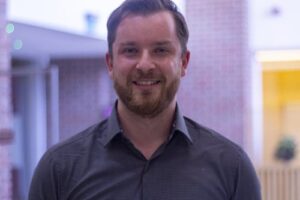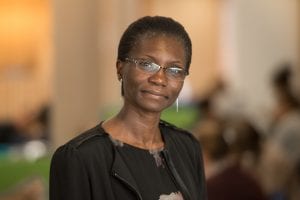Studies in Primary Education & Education and SEND
Welcome to the Studies in Primary Education & Education and SEND Programme
Team

Dr Stephen Dixon – Stephen is Senior Lecturer in Education and Multi Professional Practice, and teaches on a range of programmes, including the BA (Hons) in Education Studies, the BA (Hons) in Studies in Primary Education, the Foundation Degree in Learning and Teaching, the MA (Education) and the Professional Doctorate in Education (EdD), for which he also supervises doctoral students.
Previously a Senior Lecturer in ICT, Stephen specialises in E-learning, and the use of multimedia in learning and teaching, with particular focus on web based materials and web design, as well as film making (he is an Apple Certified Pro). He also acts as external consultant and external examiner for other universities.
He is a Fellow of the Higher Education Academy, and a member of the Executive Committee of BESA (the British Education Studies Association), for which he acts as Secretary. He is on the Board of Reviewers for the journals: Pastoral Care in Education, Educational Futures and Transformations, and is currently co-editor of Educational Futures.

Dr Ben Johnson – Ben is a Senior Lecturer in Education at Newman University. He has over eight years’ experience of teaching and leadership in Primary schools setting across the UK. He completed his PhD in 2020 conducting a narrative inquiry into teachers’ perceptions on creating communities of practice that disrupt heteronormativity in primary schools.
His research interests include, critical pedagogy, developing equality, inclusivity and diversity provision in schools, social justice and issues of teacher agency and empowerment.

Dr Linda Enow – Linda is a Senior Lecturer in the department of Education and Multi Professional Practice within the Faculty of Education. She teaches on the Postgraduate, Undergraduate and Foundation degree programmes.
Prior to gaining her Doctor of Education degree, Linda worked in Secondary Schools in the positions of teacher of English, whole school Literacy Coordinator, and Leader of Learning (Head of Department) in the English Department. Linda has been a teacher since 1996.
She also has past experience of teaching Academic English at HE level, inclusive of Course Leader role. Her doctoral research on Teacher Cognition focused on the tacit, non-observable components in teaching; undertaking her research using the multi method research design.
Linda’s areas of research specialism are: teacher cognition, cognitive processes in teaching, teacher development, and developing teacher expertise. She has also contributed to research on Alternative Educational Provision. Her research has been presented at national conferences. Linda has experience of supervising EdD and PhD students.

Andrew Edgar – Prior to joining Newman, Andrew taught in a Midlands primary school where he held responsibility for Modern Foreign Languages and History.
Andrew completed his PGCE at Edge Hill University in 2005 and his research interests include the acquisition of second languages and the nature of transition between primary and secondary school. Additionally, Andrew is interested in a wide range of issues relating to inclusion, equality and diversity in education.

Miranda Barker – Miranda is a Senior Lecturer in Education and Special Educational Needs and Inclusion who started at Newman University in early 2023 and currently works with the Education and Multi-Professional Practice Team, teaching on the BA in Educational Studies, Education and SEND and Master’s in Education courses.
Prior to this, Miranda was a Senior Lecturer in Primary Education with responsibility for Special Educational Needs and Inclusion at Birmingham City University working across the BA and PGCE as well as on the Early Career Framework courses.
Miranda qualified as a primary school teacher from the University of Warwick in 1998 and her previous experience includes 11 years working as a class teacher in primary schools, including being a special educational needs coordinator and senior leadership positions.
Brief Summary
Studies in Primary Education and Education and SEND (Share same modules in Semester 1 at Level 4)
In your first semester with us, you will engage in the following modules: PSU401 The Purpose of Education where you will introduce yourself to the purpose of education.
It gets you to think philosophically about the purpose of education. Is it fair? Who benefits? Also, you will explore PSU402 The Importance of Core Subjects in the Primary Phase. This module provides you with an introduction to the English, Mathematics and Science programmes of study of the National Curriculum. Key aspects of subject knowledge within the three subject areas will be addressed.
Alongside these modules, you will also study PSU403 Child Development, the Primary Classroom and Interpersonal Relationships. This module will develop your knowledge and understanding of child development. The module will focus on children’s physical, cognitive, communication and emotional development including the individual factors that can influence how a child grows and the impact on those in education, such as health, environment and relationships.
Foundation degree in Education, Teaching and Learning Support.
Your first semester with us starts with engaging in ELF401 The Interdependent Learner. The aim of this module is to help support you to develop the key skills necessary for study at Undergraduate level. The nature and demands of study at a higher level will be studied and explored with reference to an online shared collaborative reflection space.
Alongside this you will engage with ELF402 Children and Young People in Society, this module aims to introduce you to the range of issues that exist for young people in society. It will draw upon theoretical perspectives and will enable you to reflect upon their own experience within your professional settings.
Finally you will study ELF403 Theories of Education, This module aims to equip you with an in-depth understanding of wider theories of education. It aims to help you in developing your own philosophy of education and begins with exploring personal ideologies around the nature and purpose of education.
You will be encouraged to debate and critically analyse theories around knowledge, learning, motivation, curriculum and schooling and create a podcast about your own educational philosophy.

Pre-Course Reading
General reading pre-course (foundation and Undergrad)
Bartlett, S. and Burton, D. (2016) Introduction to education studies. London: Sage.
Ball, S. (2017) The education debate. 3rd edn. Bristol: Policy Press. (2013, 2nd edn is an (eBook)
Biesta, G. (2014) The beautiful risk of education. Boulder: Paradigm Publishers. EBook
Gray, C. and MacBlain, S. (2015) Learning theories in childhood. London: SAGE.
Illeris, K. (2018) Contemporary theories of learning: learning theorists – in their own words. London: Routledge.
Indicative Recommended Reading
Aubrey, K. (2022) Understanding and using educational theories. Los Angeles: SAGE.
Aubrey, K. and Riley, A. (2017) Understanding and using challenging educational theories. London: Sage.
Chomsky, N. (2003) Chomsky on democracy and education. London: Routledge Falmer.
Curtis, W. (2009) Learning in contemporary culture. Exeter: Learning Matters. eBook
Curtis, W. and Pettigrew, A. (2010) Education studies reflective reader. Exeter: Learning Matters.
Curtis, W. and Dufour, B. (2011) Studying education: an introduction to the key disciplines in education studies. Maidenhead: McGraw-Hill Open University Press.
Dei, G.J.S. (2011) Indigenous philosophies and critical education: a reader. New York: Peter Lang.
Dewey, J. (2004) Democracy and education: an introduction to the philosophy of education. Delhi: Aakar Books.
Freire, P. (1996) Pedagogy of the oppressed. Harmondsworth: Penguin.
Goodson, I. (2003) Professional knowledge, professional lives: studies in education and change. Buckingham: Open University Press. EBook
Gray, C. (2021) Learning theories in childhood. London: SAGE.
hooks, B (1994) Teaching to transgress: education as the practice of freedom. New York: Routledge.
Green, A. (2008) Renewing dialogues in Marxism and education: openings. Palgrave Macmillan.
Illich, I. (1996) Deschooling society. London: Marion Boyars.
Lei, J. (2011) Handbook of Asian education: a cultural perspective. New York: Routledge.
Moncrieffe, M.L. (2020) Decolonising the history curriculum: Euro-centrism and primary schooling. Basingstoke: Palgrave Pivot.
Neill, A.S. (1962) Summerhill: a radical approach to education. London: Gollancz.
Perryman, J., Maguire, M., Braun, A. and Ball, S. (2018) ‘Surveillance, governmentality and moving the goalposts: the influence of Ofsted on the work of schools in a post-panoptic era’, British Journal of Educational Studies, 66 (2), pp. 145-164.
Available at: https://eds.b.ebscohost.com/eds/pdfviewer/pdfviewer?vid=1&sid=eaec5918-9a28-4c0b-aae9-19e0008c0e25%40pdc-v-sessmgr03
Steers, J. (2014) ‘Reforming the school curriculum and assessment in England to match the best in the world – a cautionary tale’, International Journal of Art and Design Education, 33 (1), pp.6-18.
Available at: https://eds.b.ebscohost.com/eds/pdfviewer/pdfviewer?vid=1&sid=eaec5918-9a28-4c0b-aae9-19e0008c0e25%40pdc-v-sessmgr03
Usher, R. (1994) Postmodernism and education. London: Routledge.
Wrigley, T. (2006) Another school is possible. London: Bookmarks.
Wrigley, T., Thomson, P. and Lingard, B. (2012) Changing schools: alternative ways to make a world of difference. London: Routledge. eBook
Planned Online Meetings
Monday 18th September between 10 and 11.30 feel free to come and drop-in online to meet the team. Hosted by Ben Johnson. You can join here:
Microsoft Teams meeting
Join on your computer, mobile app or room device
Click here to join the meeting
Meeting ID: 373 326 504 352
Passcode: jSLDwh
Download Teams | Join on the web
Or call in (audio only)
+44 20 7660 8279,,918837176# United Kingdom, London
Phone Conference ID: 918 837 176#
Find a local number | Reset PIN
Learn More | Meeting options
Timetable Information
Semester 1
Mondays 14.00 – 17.00
Tuesdays 9.00 – 12.00
Thursdays 9.00 – 12.00
Full details of your individual academic timetable will be available via your university email calendar after you have completed online enrolment and set up your student login.
Subject Sessions:
Monday 14.00 – 17.00
Here are the dates and times during our welcome week when your teaching team will be expecting you on campus for welcome activity. Come to main reception and the welcome mentors will get you to the correct rooms:
- 19.09.23 10-2 HI104
- 21.09.23 10-2 CH116
Even if your course team are not expecting you to be in during Welcome Week on Tuesday 19th September, we strongly encourage you to come in and participate in our Student Union Fresher’s Fair.
Running between 10am and 3pm, it will give you a great insight into the Student Union, its societies and its engagement with community groups and employers. You can find out more at Newman Students’ Union – Your Voice.
